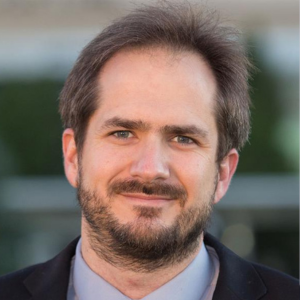A pair of University of Colorado Cancer Center researchers have received a major grant to fund the next five years of their long-running research into a genetic risk factor for ovarian cancer that varies greatly across different ethnic communities – research that they hope will lead to better-targeted therapies.
The recipients are Matthew Sikora, PhD, and Benjamin Bitler, PhD, both members of the CU Cancer Center. Sikora is an associate professor of pathology in the University of Colorado School of Medicine, and Bitler is an associate professor of obstetrics and gynecology and basic reproductive science at the CU School of Medicine.
The research project grant, known as an R01, is from the National Cancer Institute (NCI) at the National Institutes of Health as part of its Basic Research in Cancer Health Disparities program.
The overall grant for the five-year project, awarded Sept. 21, is just under $3 million, with $645,565 budgeted in total cost for the first 12-month period.
“To our understanding, our grant is the first at the University of Colorado Anschutz Medical Campus and across CU funded under this program, and highlights the innovative work we’re able to do here to understand health disparities,” Sikora says.
A common cause of death
Ovarian cancer is the fifth most common cause of cancer-related deaths in women in the U.S., according to the American Cancer Society. The risk of a woman getting ovarian cancer during her lifetime is around one in 78.
“Identifying and understanding genetic risk factors driving ovarian cancer disparities is critical to improving risk assessment, treatment paradigms, and patient outcomes,” the researchers say in their project proposal.
Sikora, whose lab is focused on breast cancer, and Bitler, whose lab focus is ovarian cancer, have been collaborating on ideas since they established their labs about seven years ago, and this project stems from what they have discovered over the years with support from a “daisy chain” of pilot grants, Sikora says.
Their work received pilot funding and collaborative support from the Cancer Center’s Tumor Host Interactions Program (THI) and the Office of Community Outreach and Engagement (COE). Early backing also came from the nonprofit group Golfers Against Cancer.
A focus on disparities
Evelinn Borrayo, PhD, the CU Cancer Center’s associate director of community outreach and engagement, says Sikora and Bitler’s work supports a goal in the center’s strategic plan to reduce cancer disparities. “Part of that effort is incentivizing research with a focus on disparities. Their project is the first tangible result of those efforts from the Cancer Center,” she says.
The project will spotlight a genetic variant called rs3820282. “In the literature, this variant has been linked to a whole host of gynecologic diseases, including ovarian cancer,” Sikora says. “Our project will define the cell biology changes that link this variant to changes in ovarian cancer biology.”
The prevalence of rs3820282 varies widely by ethnic population: 45% to 55% in East Asian women, 20%-40% among Latinas, about 15% in the non-Latina white population, and almost 0% among Black women.
One subtype of ovarian cancer – ovarian clear cell carcinoma – represents just 5% of ovarian cancer cases in the United States but 20% to 25% in East Asia, mirroring the prevalence of rs3820282 in those populations, Bitler says.
The project seeks to understand “what this genetic variant is doing; how the fact that it's different across populations influences cancer risk, cancer biology and metabolism, and outcomes; and ultimately how we can exploit that understanding in the long term,” Sikora says.
Staying committed
The work will go on after five years, Bitler says.
“NCI has been pushing this concept of precision medicine for over a decade,” he says. “And so, because of the disparity among ethnic populations that this variant impacts, and the fact that there are active therapies in the space of metabolism, our vision for this is that maybe we reapply at year six to do a clinical trial where we're screening patients that may or may not get a metabolic inhibitor. Our vision is that we will be able to tell the field that you should think about standard of care differently when you have a variant-carrying patient. Matt and I are committed to this.”
Sikora and Bitler also credit Linda Cook, PhD, the Cancer Center’s associate director of population sciences, and Lindsey Treviño, PhD, an assistant professor at City of Hope in Duarte, California, as co-investigators on the project. City of Hope and BC Cancer in Vancouver, British Columbia, are collaborating with the Cancer Center team on the part of the project focused on disparities in cancer outcomes.






